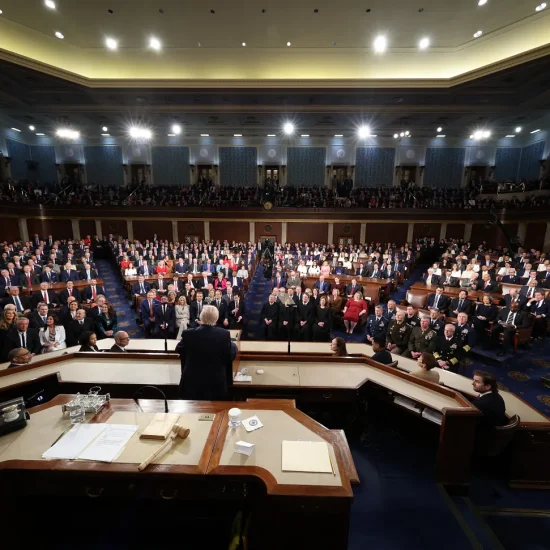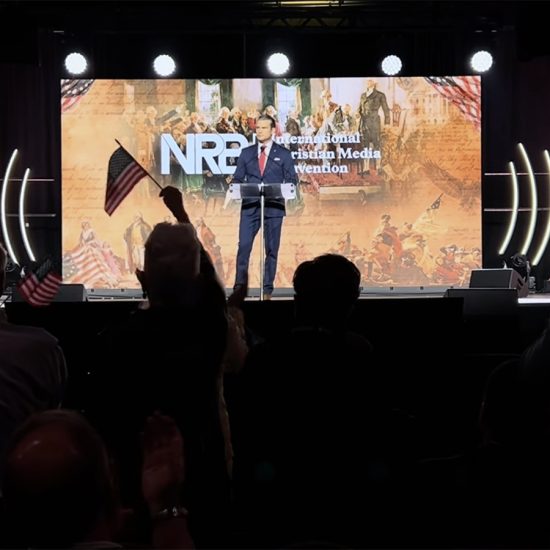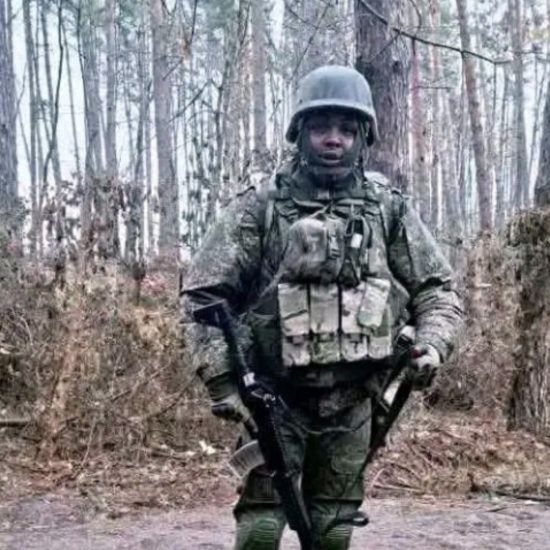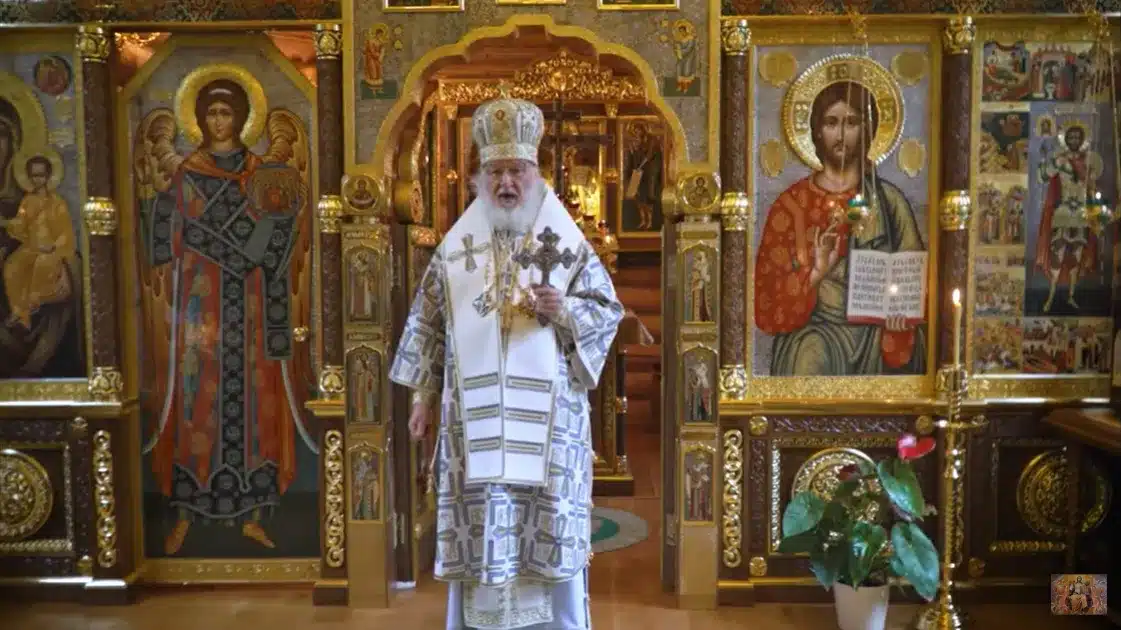
The preacher on Sunday talked about a blood sacrifice washing away people’s sins. But the one providing salvation through sacrifice wasn’t Jesus. It was the Russian army.
“We know that today many are dying on the fields of internecine warfare,” Patriarch Kirill, head of the Russian Orthodox Church, declared during his sermon on Sept. 25. “The Church is aware that if someone, driven by a sense of duty, the need to fulfill an oath, remains true to his calling and dies in the line of military duty, then he undoubtedly commits an act that is tantamount to a sacrifice. He sacrifices himself for others. And, therefore, we believe that this sacrifice washes away all the sins that a person has committed.”
Lest there be any misunderstanding about the level of sacrilegiousness offered by the religious leader closely aligned with Vladimir Putin’s regime, Kirill started his remarks by quoting John 3:16 and noting the “divine sacrifice required” as part of a “divine plan.”
“[Jesus] gives us the opportunity to understand that if God in his son gives his human life for the sake of other people, for the sake of the human race, then sacrifice is the highest manifestation of a person’s love for his neighbors. Sacrifice is the great manifestation of the best human qualities,” Kirill proclaimed before launching right into his comments about soldiers dying.
Later in his “sermon,” Kirill referred to the war as “going on in the vastness of Russia,” language that denies the sovereignty of Ukraine and instead suggests the land — as Putin argues — should still be part of a Russian empire. Or as Kirill put it moments later, “the single spiritual space of Holy Russia.” He added that he is praying to God about “the outcome of the battles” and, in truly Orwellian terms, that there would “not be a wave of bitterness and alienation” that divides people “by an impenetrable wall of hatred” in “how we all behave today towards each other.”
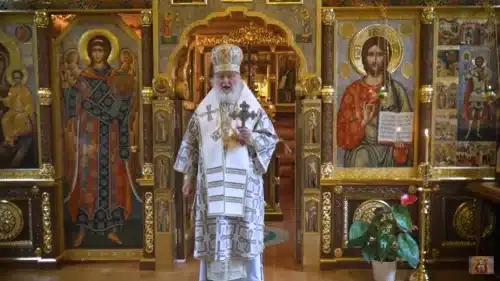
Screengrab as Patriarch Kirill preaches at the Church of the Blessed Prince Alexander Nevsky near Moscow, Russia, on Sept. 25, 2022.
Offering his first Sunday sermon since Putin greatly expanded military conscription of Russians amid heavy losses in the invasion of Ukraine, Kirill exhorted the Russian believers to remain faithful to the crusade. He later added he believes that “all the saints who shone in the Russian land” join them today in prayers for “peace” and to let “justice triumph” (by which he means Russia conquers and occupies Ukraine).
“This can only happen if we live with faith in our hearts because faith destroys fear. Faith gives the possibility of mutual forgiveness. Faith strengthens relationships between people that can really transform and is transforming these relationships into brotherly, cordial, and kind,” he claimed.
Kirill’s religious sentiments stand in stark contradiction with the war’s realities. He’s co-opted the vision of the sacrifice of Jesus to bless a false rite of military sacrifice. In this bloody vision of Christian Nationalism, we find many warnings. So, in this issue of A Public Witness, we look at religious support and criticism of the Russian invasion of Ukraine. And we hold up a candle to expose sacrilegious efforts to conflate church and state.
Get cutting-edge reporting and analysis like this in your inbox every week by subscribing today!
Consecrating War
Such warmongering from Kirill isn’t new. He’s been sanctifying the invasion of Ukraine since before it started. As we documented months ago, he early on portrayed the conflict as a spiritual struggle and used his religious authority to justify the supposed righteousness of Russia’s cause. Kirill has long been closely aligned with Putin in a symbiotic relationship. The state protects the Russian Orthodox Church, while the latter provides moral legitimacy and promotes social and political unity for the former.
As Michael Khodarkovsky, a history professor at Loyola University Chicago, explained in 2019, “Under Mr. Putin, the state has co-opted and subsumed the church. The Kremlin has relied on the Orthodox Church as the main unifying force in the country and provides it with generous financial support. In return, the church has been the key promoter of a ‘Russian world’ concept that casts the Kremlin as a defender of Russians outside Russia. Patriarch Kirill, the head of the Russian Orthodox Church, has gone so far as to call the Putin era ‘a miracle of God.’”
Russia’s setbacks on the battlefield, condemnation from world leaders, and the bite of economic sanctions have left Putin’s army and ambitions in a precarious position. With the forced conscription highlighting the struggles experienced by Russian forces and spreading the costs of the war across a wider swath of the population, new pockets of protest erupted. Ethnic minorities and other persecuted groups appear to be disproportionately summoned into service. Citizens are fleeing the country and googling how to break their arms to avoid enlistment.
These dynamics make Kirill’s blessing even more important. Battlefield losses threaten to diminish national pride and undermine the war effort. They reduce morale among troops and the willingness of civilians to join the fight — all at a time when Putin desperately needs support for his immoral invasion. In this context, the religion proclaimed by Kirill becomes a tool to imbue an unwise and poorly-executed human conflict with transcendent meaning.
Citing historical scholarship, sociologist Kim Philip Hansen noted that “in modern societies, ideological by nature and dependent on conscripts, new ways had to be found to motivate citizen soldiers to lay down their lives for a cause.” Faith is one tool states have for inspiring their populace to pick up their weapons and risk their lives. They just need an authoritative messenger, which Kirill continues to provide, as Khodarkovsky noted.
“The Russian Orthodox Church and Patriarch Kirill have been consistent supporters of Putin’s regime. They were blessing the aircrafts and rockets, they were supporting Russia’s wars from Syria to Ukraine, and they were silencing any dissident voice within the church,” Khodarkovsky told us. “This is very much a part of the Russian Orthodox Church’s historically traditional attitude, which applied both in tsarist Russia as well as Putin’s one.”
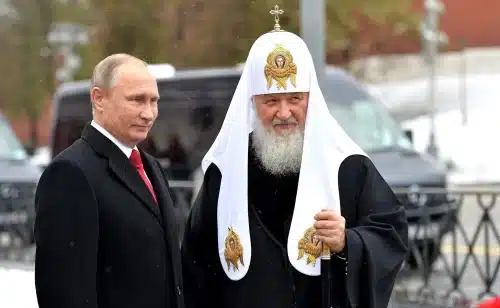
Vladimir Putin and Patriarch Kirill on Unity Day in 2016. (Creative Commons)
Other Russian Orthodox leaders have followed their leader’s cues. Archbishop Gabriel, who oversees part of the church’s presence in Canada, denounced sanctions imposed on Kirill, and Gabriel parroted false Russian talking points about defeating Ukrainian extremists as motivating the invasion. He also described the conflict in spiritual terms: “[Ukrainian nationalists] don’t act in a Christian way but at the instigation of demonic powers — there is no other way to call that absolutely barbaric, reckless nationalism they profess.”
As we’ve noted before, depicting opponents as Satan’s agents is a powerful rhetorical device. There is no compromising with the devil. Destruction is the only virtuous response when you’re fighting Lucifer’s minions. In this case, the warfare is literal, war crimes are being committed by Kirill’s crusaders, and thousands made in the image of God have been killed.
Global Christian Responses
Kirill’s rhetoric conflating Russian soldiers dying for Putin’s imperial dreams with the salvation that comes from Jesus raises the stakes for other Christians in how they respond to his bloodthirsty, heretical sermons. Shortly after the war started, we argued in March that the World Council of Churches should suspend the membership of Kirill and the Russian Orthodox Church. Unity loses its meaning when one member lies about and cheerleads the destruction of another.
But the WCC, which met in Germany for its assembly earlier this month, refused to strip Kirill or the ROC of membership. The WCC instead passed a resolution that condemns the Russian invasion of Ukraine. Yet, there are several statements in it calling on actions by “all sides” and “all parties,” as if Ukrainians might be equally culpable of human rights violations or dangerous military actions. The resolution also offers what should be a condemnation of Kirill but seems toothless when the WCC refused to actually apply it.
“We also strongly affirm the central committee’s declaration that war is incompatible with God’s very nature and will for humanity and against our fundamental Christian and ecumenical principles, and accordingly reject any misuse of religious language and authority to justify armed aggression and hatred,” the resolution offers.
The resolution then claims that having church representatives present from Ukraine and the ROC “served as a practical opportunity” to live out the WCC mission “to seek unity and together serve the world.” Yet, during the meeting, Roman Sigov of the Ukrainian Orthodox Church criticized the resolution as “a statement which treats the victim and the aggressor in the same way.”
How can there be unity when there is injustice? How can there be dialogue when one side is convinced they’re on a righteous crusade from God to kill the other side?
Or as Igor Bandura, vice president of the All-Ukrainian Union of Associations of Evangelical Christians-Baptists, put it last week during the 2022 European Baptist Federation meeting in Latvia, Ukraine doesn’t need peace but “just peace” because there cannot be real peace without justice. And the group affirmed a resolution calling for not only an end of the Russian invasion but also a return of Ukrainian land and reparations paid by Russia.
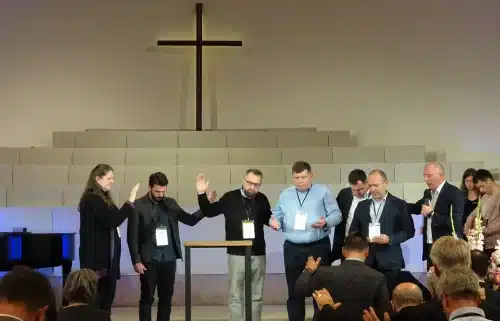
Baptists from more than three dozen countries pray over Ukrainian Baptists during the opening worship session of the European Baptist Federation’s general council on Sept. 21, 2022, at Mateja Draudze (Matthew Church) in Riga, Latvia. (Brian Kaylor/Word&Way)
Other global religious leaders are also increasing their condemnation as Russia’s aggression continues and Kirill’s impious rhetoric increases. Pope Francis spent months trying to walk a middle ground as he sidestepped clearly naming Russia as the aggressor and said things like the war was “perhaps somehow either provoked or not prevented.” But that changed late last month.
“As for the large-scale war in Ukraine, initiated by the Russian Federation, the interventions of the Holy Father Pope Francis are clear and unequivocal in condemning it as morally unjust, unacceptable, barbaric, senseless, repugnant, and sacrilegious,” the Vatican said in a statement.
Then this month, Francis told a group of religious leaders from around the world — including ROC members — during a gathering in Kazakhstan that religion shouldn’t be used to justify “evil” war. He added, “May we never justify violence. May we never allow the sacred to be exploited by the profane. The sacred must never be a prop for power, nor power a prop for the sacred!” Of course, that’s exactly what Kirill — who skipped meeting with Francis in Kazakhstan — did Sunday.
Help sustain the ministry of Word&Way by subscribing to A Public Witness!
The Meaning of the Cross
It’s impossible to divorce Kirill’s proclamations from the moral repugnance of Russia’s invasion of Ukraine. He’s sanctifying an ongoing military offensive that’s resulted in deaths and a severe humanitarian crisis. The recent discovery of mass graves offers a horrific rebuke to his sentimental sermons.
Still, there’s a larger lesson that all Christians — and especially preachers — need to learn here. Kirill exemplifies a danger of Christian Nationalism, which seeks to fuse religious and national identities. His uncritical loyalty serves the ends of the state at great cost to the church. But this heresy doesn’t just occur in Russia with Kirill. Some U.S. churches take to heart the line from “The Battle Hymn of the Republic,” a war song from the Civil War: “As he died to make men holy, let us die to make men free.”
Consider Robert Jeffress of First Baptist Church in Dallas, Texas, leading an annual “worship” service just ahead of the Fourth of July called “Freedom Sunday.” As he said in one promotional video, “That Sunday, we will celebrate our freedom as Americans and our freedom in Christ with inspiring, patriotic worship, a salute to our Armed Forces, fireworks, and I will deliver a very special message titled ‘America is a Christian nation.’”
As he spoke, images from previous years flashed on the screen showing a sanctuary full of people waving American flags, a military color guard standing with the American and Texan flags in front of the podium as fireworks shoot off on the stage, and the official emblems of the branches of the U.S. military hanging above the church’s stage. It’s basically a low-church, high-entertainment version of Kirill’s sermon on Sunday.
Or consider the proclamation last year by President Joe Biden after a terrorist bombing in Kabul, Afghanistan, killed 13 American soldiers. The president rightly honored their service to their nation and mourned their deaths. But he also christened the entire military, arguing that to enlist is to make a commitment to serve God.
“Those who have served through the ages have drawn inspiration from the Book of Isaiah, when the Lord says, ‘Whom shall I send … who shall go for us?’ And the American military has been answering for a long time: ‘Here am I, Lord. Send me,’” Biden said.
Biden made the same error as Kirill, depicting national military service as inherently a divine mission.
Or consider the assertion made by U.S. Supreme Court Justice Samuel Alito in 2019 when he suggested that the Christian cross could instead be a generic symbol representing the sacrifice of American soldiers regardless of their faith.
“That the cross originated as a Christian symbol and retains that meaning in many contexts does not change the fact that the symbol took on an added secular meaning when used in World War I memorials,” Alito claimed in the majority ruling in a case involving a large cross monument in Maryland. “The cross has also acquired historical importance with the passage of time, reminding the townspeople of the deeds and sacrifices of their predecessors as it stands among memorials to veterans of later wars.”
Stripping the cross of its Christian meaning to sacralize deaths for a nation is what Christian Nationalism does. Kirill similarly co-opted the cross, holding one in his hand as he preached Sunday about dying for Russia as a salvific act.
These moments expose the temptation for Christians to place their ultimate faith in the state and its propensity towards preserving and securing power through violence. And why does this occur? To secure their legitimacy, nation-states depend on more than the efficient administration of services. Those efforts are not enough to instill loyalty and purpose in its citizens. As philosopher Alasdair MacIntyre pointed out, absent “sacred values” or a larger sense of meaning, those called to defend a country with their lives are being asked “to die for the telephone company.” Seeking an inspiring transcendent meaning, religion offers a potentially powerful message for a state to exploit. But Christians must resist such efforts.
“The longing for true communion that Christians recognize at the heart of any truly common life is transferred onto the nation-state,” theologian William Cavanaugh wrote in Migrations of the Holy. “The urgent task of the church, then, is to demystify the nation-state and to treat it like the telephone company. At its best, the nation-state may provide goods and services that contribute to a certain limited order. … The state is not the keeper of the common good, however, and we need to adjust our expectations accordingly.”
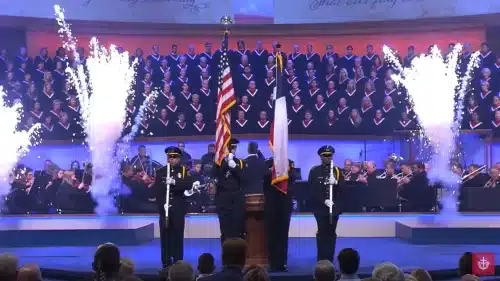
Screengrab of a “Freedom Sunday” service at First Baptist Church in Dallas, Texas.
Those who imbue national violence with sacred meaning create a false religion of blood sacrifice that leads not to freedom but instead to more hellish warfare. As Christian theologian Stanley Hauerwas warned in War and the American Difference, we too often see people sacrificed “upon the altar of the nation” as war becomes “a ritual.” He particularly sees this idolatrous ritual in the U.S. context since “war remains for Americans our most determinate moral reality.”
“War is America’s altar,” Hauerwas explained. “The [Civil] War did not force American Christians to deeper theological insights because the war was, for America, our church. … If the Civil War teaches us anything, it is that when Christians no longer believe that Christ’s sacrifice is sufficient for the salvation of the world, we will find other forms of sacrificial behaviors that are as compelling as they are idolatrous. In the process, Christians confuse the sacrifice of war with the sacrifice of Christ.”
When national and Christian identities are conflated, to die for the nation is to die for God. To refuse to die for the nation is to deny God. This crusader ideology doesn’t only lead to justifying bloody attacks on innocent civilians, but it also advances heresies that attack the core of the gospel teachings. Let us not join Kirill in waging this unorthodox war on both these fronts.
As a public witness,
Brian Kaylor & Beau Underwood

